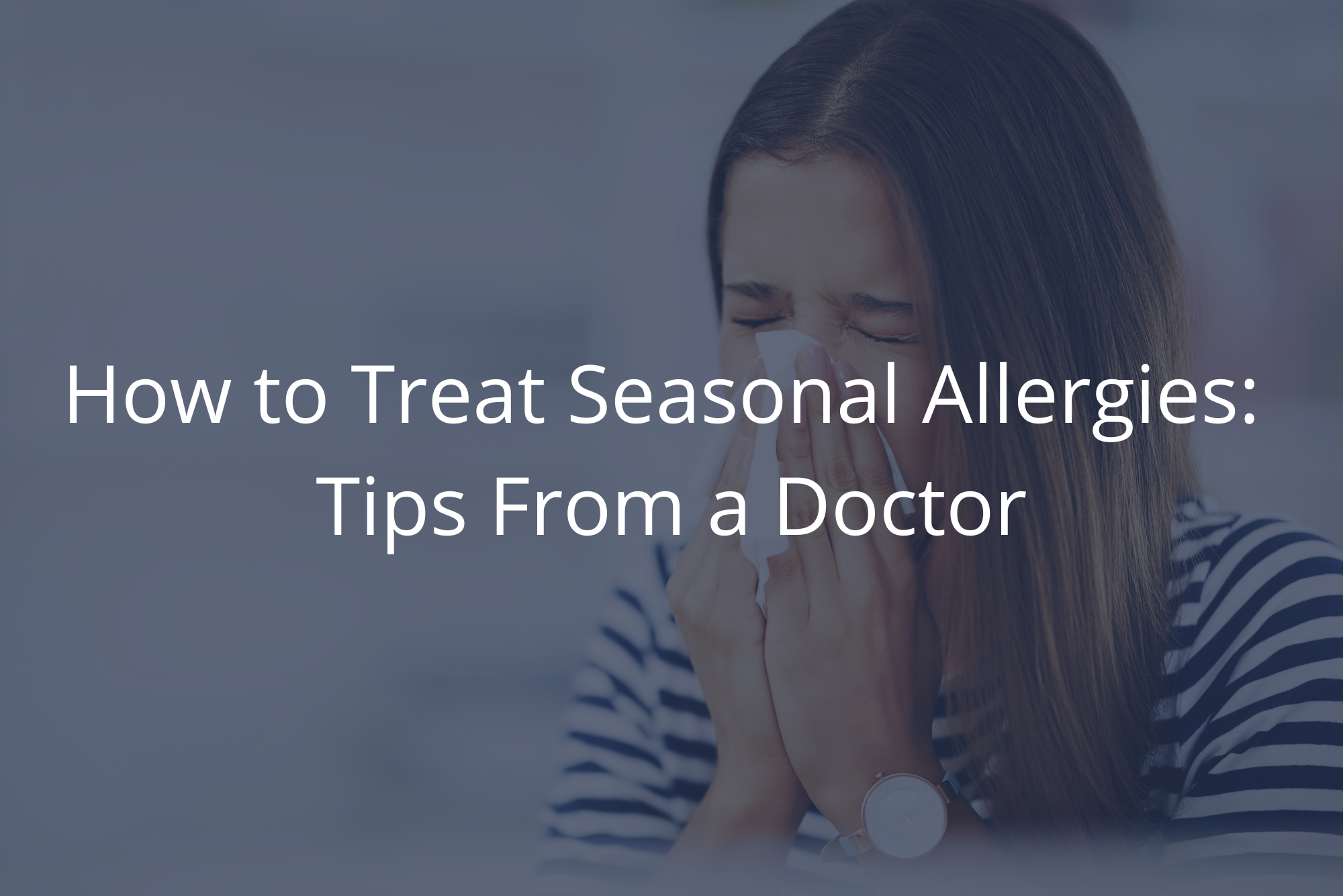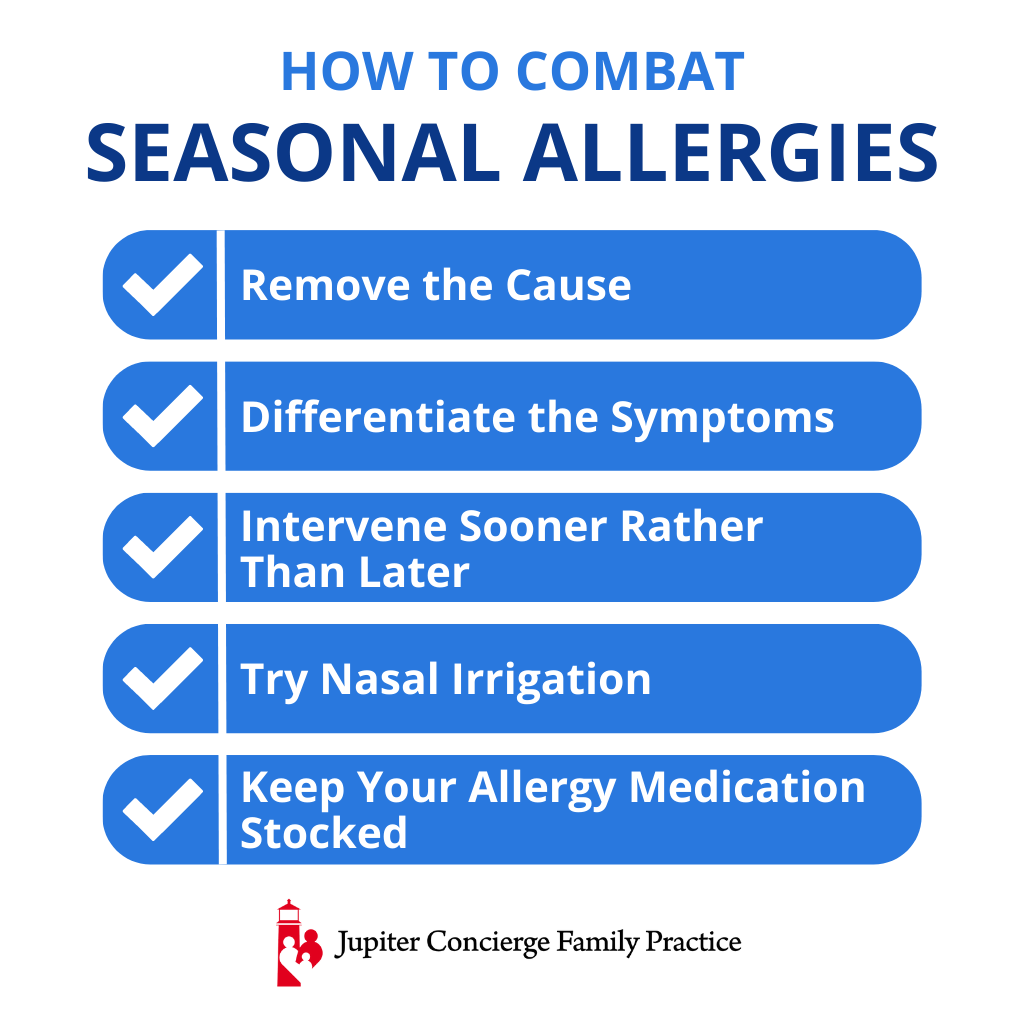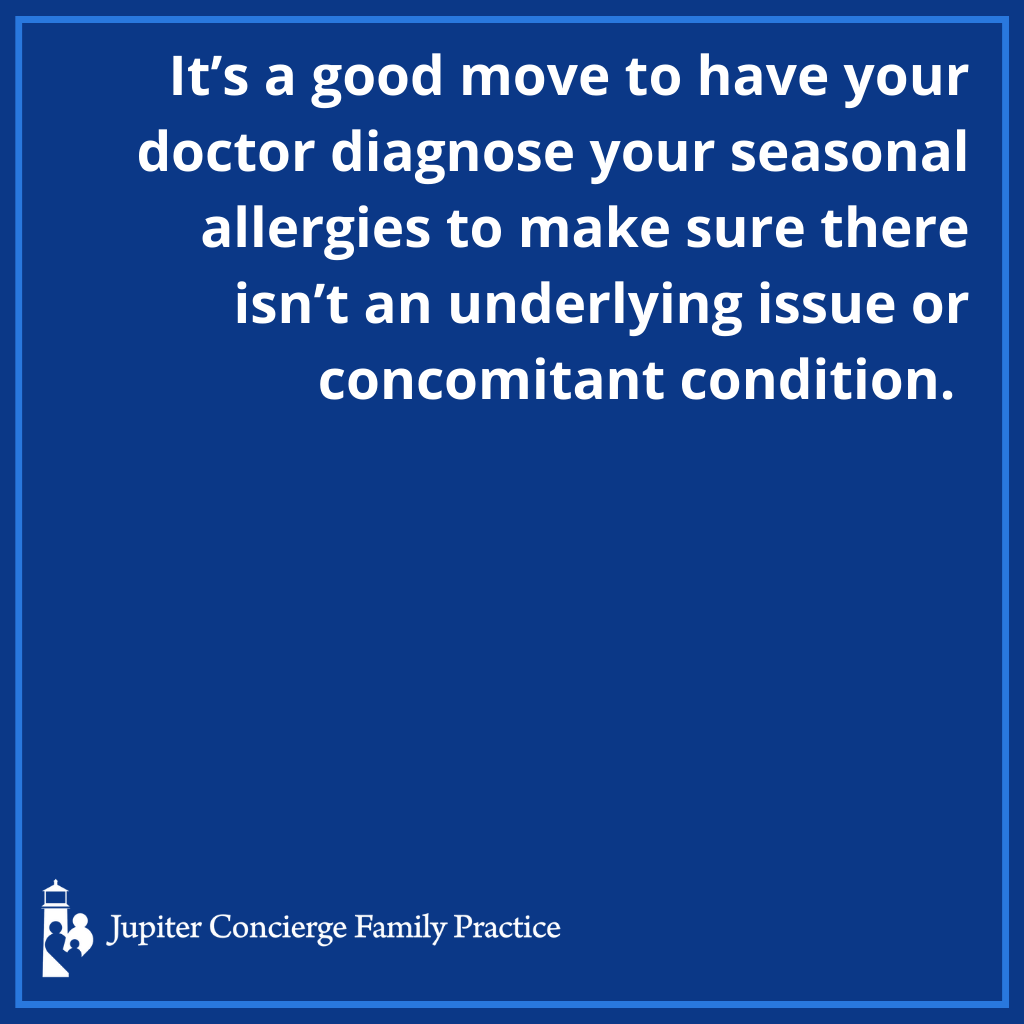
According to the Centers for Disease Control (CDC), almost 60 million Americans deal with seasonal allergies, also called hay fever or allergic rhinitis, each year. That’s a lot of sneezing and eye-mopping.
Whether it’s the full bloom of spring or the ragweed of fall that sets them off, I’ve put together the following tips on allergies to help you navigate the changing seasons.
Seasonal Allergies, Unpacked
Before we get to the how-to of my allergy tips, let’s be sure we’re talking about the same thing, since the terms “allergic” and “allergies” can get tossed around rather indiscriminately.
True allergic reactions are complicated and sometimes very severe immune responses to specific allergens, or proteins. An actual allergic reaction can be life-threatening (think bee stings and nut allergies), putting the body into anaphylactic shock.
When we talk about seasonal allergies, however, we’re not talking about quite the same mechanism. In fact, a more accurate term for seasonal allergies might be environmental sensitivities. With seasonal allergies, a different process occurs in the body, leading to a more benign — but highly annoying and often disruptive — response.
Seasonal allergies occur when your immune system overreacts to an airborne substance. The most common allergens — or environmental irritants — that stir up seasonal allergies include:
- Pollens (from various trees and plants)
- Smoke (from fires)
- Chemicals in the air (from industry)
- Red yeast in the ocean (affecting beachgoers)
Whether it’s pollen, a pollutant, or ocean particles, seasonal allergies generally produce one or more of these symptoms:
- Runny nose
- Itchy nose
- Sneezing
- Coughing
- Post-nasal drip
- Skin itching and/or rash
- Itchy ears
- Runny, itchy eyes
- Shortness of breath
- Headache
- Fatigue
Tips for Combatting Seasonal Allergies
Now that we’ve established what seasonal allergies are (and aren’t), what triggers them, and what their symptoms look like, let’s move on to tips for improving your quality of life when allergies strike.
Allergy Tip #1: Remove the Cause
The first step in any (and every!) medical problem is to remove or minimize exposure to whatever is causing the problem. This may seem obvious, but it’s easy to overlook in the case of seasonal allergies.
When your allergies worsen, try to rearrange your external environment as much as possible. This can mean closing your windows, turning on the air conditioning, or running a high-quality air purifier. Another option might be wearing an effective mask when outdoors to minimize your allergen exposure.
You can also rearrange activities so your allergies don’t worsen. For example, you might reconsider that outdoor concert if a certain aggravating tree is in bloom. Or maybe you’re planning an alfresco dinner, but the patio is yellow with pollen. Opt to eat inside instead.
Avoidance can save you a lot of trouble.
Allergy Tip #2: Differentiate the Symptoms
Before you treat your symptoms, ensure that they are, indeed, a result of seasonal allergies. Differentiate what you’re experiencing from more serious problems.
It’s a good move to have your doctor diagnose your seasonal allergies to make sure there isn’t an underlying issue or concomitant condition. Asthma, for instance, often accompanies allergies and may not be obvious, but proper monitoring and treatment are important.
If you have seasonal allergies, remember to take stock and consider whether your symptoms are the precursor to a more serious issue. For example, it’s one thing to have a runny nose, but if your throat starts closing, that’s a medical emergency. Likewise, itchy eyes or a rash are one thing, but a raised rash (hives) is a bad sign. Pay attention to your symptoms so you’re aware if a bona fide allergic reaction is beginning.
Allergy Tip #3: Intervene Sooner Rather Than Later
Despite avoiding triggers as much as possible, you’ll likely still experience some allergy symptoms. In that case, the sooner you intervene with treatment, the better the outcome.
Seasonal allergies have an annoying habit of worsening once they get going. You know your tendencies best, but usually after things start, they’re going to get worse. So my first tip for actually treating allergies is to treat them as soon as possible.
We’ll get into the treatment options for seasonal allergies in the next sections.
Allergy Tip #4: Try Nasal Irrigation
One chemical-free treatment you can try for seasonal allergies is a saltwater rinse of the nasal passages. Unlike a spray, which largely just sits in the nose, a nasal rinse (or irrigation) actually washes the nose out. I tell people “the solution to pollution is dilution” because washing out your nasal passages means you’re removing the irritants that may be lodged there.
Nasal irrigation is also helpful when allergies get bad enough to clog up your nose. Clogged nasal passages become a breeding ground for bacterial infections, and clearing them out via nasal irrigation helps prevent subsequent problems. I suggest using a saltwater nasal rinse like NeilMed, which contains no medications.
Allergy Tip #5: Keep Your Allergy Medication Stocked
I’m not one to suggest a pill for every ill, but because you can’t always predict when seasonal allergies are going to strike, it’s a good idea to keep your over-the-counter allergy treatments stocked. That way, you can address symptoms quickly and avoid going out to the store while an irritating trigger is prevalent in the air.
Let’s go through the common allergy medications and what they’re used for:
Steroid nasal sprays. Unlike nasal irrigation from allergy tip #4, steroid nasal sprays aren’t dislodging mucus or irritants from the nasal passages. Instead, they’re topical treatments that reduce irritation and inflammation in the nose. The most common steroid nasal spray is fluticasone, often marketed under the brand name Flonase.
Antihistamines. These medications treat the histamine reaction that’s part of your allergy response pathway. When you take an oral antihistamine, the medicine goes into your bloodstream so it becomes a powerful combatant to allergy symptoms.
There are two classes of antihistamines: sedating and non-sedating. If your symptoms are preventing you from sleeping, a sedating antihistamine like Benadryl (diphenhydramine) may be appropriate. If you’re struggling with allergy symptoms during the day, a non-sedating antihistamine like Claritin, Allegra, or Zyrtec is likely more beneficial.
- Sedating antihistamines:
- Diphenhydramine (Benadryl)
- Chlorpheniramine
- Doxylamine
- Pheniramine
- Non-sedating antihistamines:
- Loratadine (Claritin and Alavert)
- Cetirizine (Zyrtec)
- Fexofenadine (Allegra)
- Levocetirizine (Xyzal)
Decongestants. Helpful for a stuffy or runny nose, decongestants can be taken either topically as a nose spray or orally in pill form. Decongestants are very potent and good at what they do, but they aren’t without side effects.
Topical decongestant nasal sprays like oxymetazoline (Afrin) can create a localized dependancy rather quickly, resulting in rebound congestion when you stop using the medication. To avoid this, refrain from using topical decongestants for longer than three days in a row.
More concerningly, oral decongestants like pseudoephedrine (Sudafed) can raise blood pressure, cause heart palpitations, and interfere with sleep. Always consult your doctor before taking an oral decongestant if you have any history of elevated blood pressure or cardiac issues.
Eye drops. When itchy eyes plague you, medicated eye drops can be a handy solution. Naphcon-A drops contain both a decongestant and an antihistamine to give you relief from itchy, watery, and puffy allergy eyes.
If putting in eye drops is a challenge for you, don’t despair! It’s a common problem with a surprisingly simple solution. Check out my video to find out how to easily self-administer eye drops.
Seasonal Allergy Tips: Final Thoughts
With the wide variety of blooming schedules for various plants and the ever-present possibilities of fires and pollution, we can’t always predict when hay fever will hit. I hope, however, you find my tips for allergies to be useful tools in maximizing your well-being and minimizing your suffering!

Dr. David Rosenberg
Dr. Rosenberg is a board-certified Family Physician. He received his medical degree from the University of Miami in 1988 and completed his residency in Family Medicine at The Washington Hospital in Washington, Pennsylvania in 1991. After practicing Emergency Medicine at Palm Beach Gardens Medical Center for two years, he started private practice in Jupiter, in 1993. He is an avid baseball fan and Beatles fanatic, since he was 8 years old. He has been married to his wife, Mary, since 1985 and has three grown children.
David completed additional studies at Mercer University, Macon, Georgia and obtained a BS in Chemistry in 1983.
“My interests include tennis, snow skiing, Pilates and self-development.”


